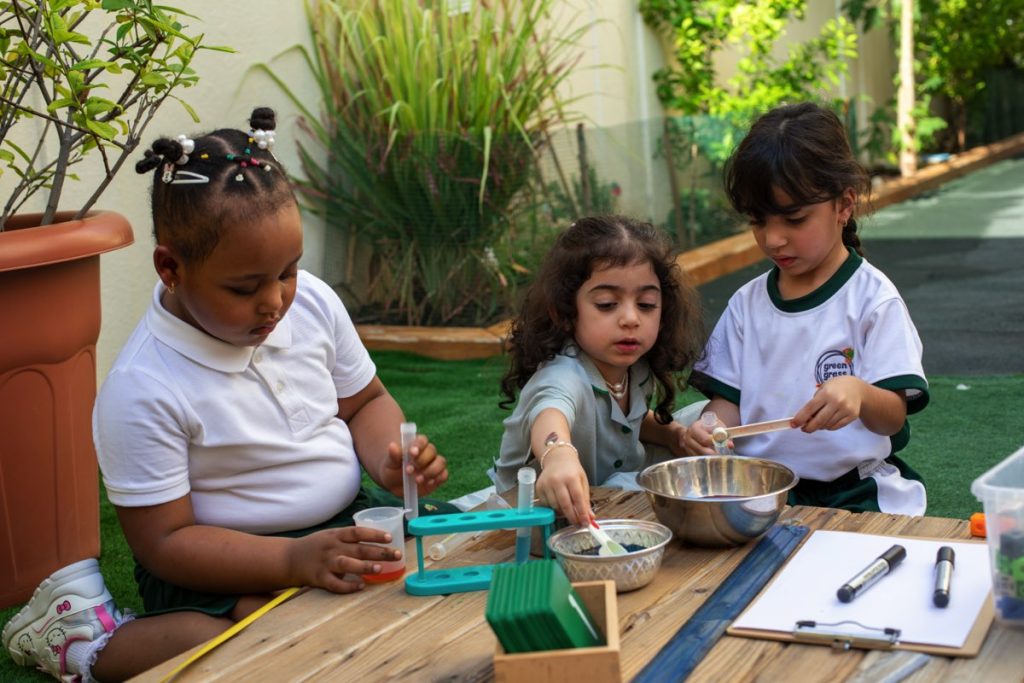From language and behaviour to emotional expression, culture silently guides how children grow, relate, and respond to the world. At Green Grass Nursery (GGN), Dubai, we see this every day; how cultural values shape a child’s confidence, learning habits, and relationships.
In this guide, you’ll learn how cultural background influences children’s emotional, social, and cognitive development. You’ll also discover why multicultural influence, parenting styles, and cultural sensitivity matter in early education; and how GGN leads the way in creating a nurturing, diverse environment in Dubai.
Culture is not just about language or festivals. In early childhood, it refers to the beliefs, behaviours, traditions, values, and communication styles passed on within families and communities.
When we talk about how culture affects child development, we are referring to how these patterns influence everything from emotional regulation to social interactions and problem-solving skills.
1. Emotional Development and Culture
Children express and manage emotions based on what their culture encourages or discourages.
In some cultures, showing emotions openly is welcomed. In others, children are taught to stay reserved.
These differences shape emotional intelligence, empathy, and even self-esteem.
At Green Grass Nursery, we help children explore their emotions in culturally respectful ways, offering tools for healthy emotional growth, no matter their background.
2. Parenting Styles and Culture
Your parenting style reflects your cultural values.
Authoritative parenting (balanced discipline and warmth) is common in many Western cultures.
Authoritarian parenting (strict rules and less dialogue) may be valued in more collectivist societies.
Each style shapes how a child sees authority, learns independence, and forms relationships.
Our team at GGN respects these differences and partners with parents to support each child with cultural awareness and sensitivity.
3. Values and Child Growth
Your parenting style reflects your cultural values.
Authoritative parenting (balanced discipline and warmth) is common in many Western cultures.
Authoritarian parenting (strict rules and less dialogue) may be valued in more collectivist societies.
Each style shapes how a child sees authority, learns independence, and forms relationships.
Our team at GGN respects these differences and partners with parents to support each child with cultural awareness and sensitivity.

Why Cultural Sensitivity in Early Learning is Critical?
Cultural sensitivity is the awareness and respect for differences in beliefs, customs, and ways of life. In early learning, this means:
- Listening to each child’s story
- Valuing different languages and traditions
- Avoiding assumptions based on appearance or behaviour
We train our educators at GGN to recognise subtle cultural needs, from greetings and meals to conflict resolution and learning styles. This creates a safe, respectful space for every child.
Comparison: Cultural Values Across Regions
Cultural Trait Western Cultures Eastern/Middle Eastern Cultures
Communication Direct and expressive Indirect and respectful
Emotional Expression Encouraged Often moderated
Focus of Learning Independence and curiosity Respect and academic excellence
Family Involvement Shared responsibility Strong family authority
Conflict Resolution Open discussion Avoidance and harmony
At Green Grass Nursery, we balance these influences by creating an environment where all cultures are understood, respected, and included.
How Green Grass Nursery Supports Culturally Diverse Families?
1. We Listen
Every family is different. Our team starts by understanding your child’s background, language needs, and home routines.
2. We Adapt
Our curriculum blends the British EYFS framework with the Reggio Emilia approach and daily Arabic classes. This allows us to:
Support bilingual development
Encourage expressive learning
Build cultural connection through storytelling, music, and play
3. We Celebrate
From UAE National Day to global festivals, we celebrate what makes every culture special. Children gain confidence in who they are while learning to appreciate others.
Why Choose Green Grass Nursery (GGN), Dubai?
Green Grass Nursery is not just a preschool; it’s a reflection of Dubai itself: modern, diverse, and future-ready.
Here’s what sets us apart:
Bilingual Learning: Daily Arabic and English instruction
EYFS and Reggio Emilia Curriculum: Play-based, child-led, and inquiry-driven
Small Classrooms: Personalised attention with low student-teacher ratios
Outdoor Classrooms: Nature-led experiences for holistic development
Award-Winning: Recognised by Edarabia, Middle East Prestige Awards, and MEA Markets
Our nurseries in Al Manara and Umm Suqeim are more than convenient locations, they are communities built around trust, learning, and belonging.
Conclusion: Culture is Not a Barrier, It’s a Bridge
Frequently Asked Questions
How does culture influence learning in early years?
Culture shapes how children respond to authority, express emotions, engage in group activities, and handle challenges.
What are the benefits of multicultural influence on children?
Why is cultural sensitivity important in nurseries?
It ensures each child feels valued, safe, and understood. It also supports better learning outcomes and emotional development.
